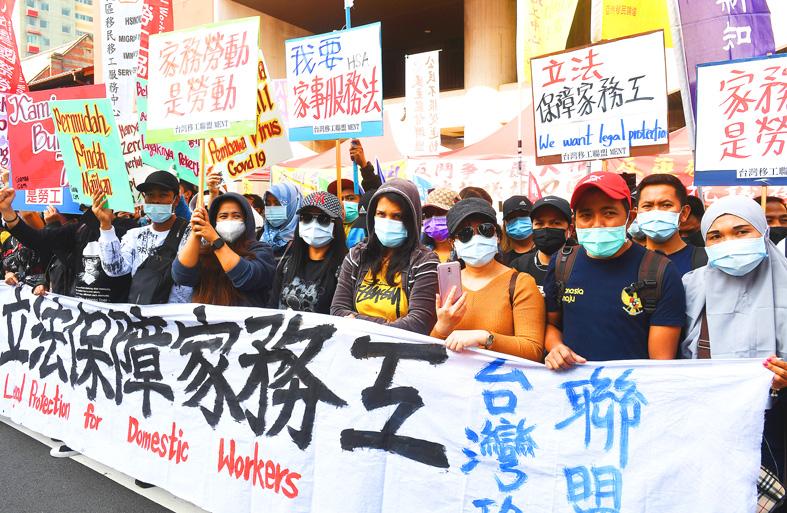About 200 migrant workers and workers’ rights advocates yesterday rallied in front of the Legislative Yuan in Taipei to push for legislation to guarantee legal protection for domestic workers.
At the heart of the protesters’ demands is a proposed “household service act” that the Migrants Empowerment Network in Taiwan (MENT) — a coalition of grassroots migrants’ rights organizations that organized the protest — has been pushing for since 2003.
Protesters held signs with messages reading “We want legal protection,” “We are not slaves and not products,” and “Stop human trafficking. Stop exploitation.”

Photo: CNA
Representatives of several groups, including MENT members such as the Taipei-based Taiwan International Workers’ Association, the Taoyuan-based Hope Workers’ Center and the Hsinchu Migrants and Immigrants Service Center, as well as supporters such as the Awakening Foundation, took part in the protest.
It has been nearly 30 years since Taiwan first allowed foreign domestic workers following the enactment of the Employment Service Act (就業服務法) in 1992, MENT said, adding that as of October this year, there were 701,240 migrant workers in Taiwan, about 33 percent of whom are domestic workers who are not protected by labor laws.
In October 2004, MENT, which was then named the Promoting Alliance of Household Service Act, proposed a draft “household service act” to protect the rights of domestic workers.
However, the Ministry of Labor never proposed a corresponding version, said the group, which was renamed in 2007.
Ahead of International Migrants Day on Friday, MENT said it would submit an updated version of its “household service act” proposal to the Legislative Yuan, as it urged the Executive Yuan to release its own version of the bill as soon as possible.
However, the ministry said that due to differences in the jobs performed by domestic workers employed by individuals and workers employed by businesses, the Labor Standards Act (勞動基準法) cannot apply to the former.
There would also be difficulties in pushing for a dedicated law, as it would be hard to distinguish between domestic workers’ working hours and rest periods, given they primarily work in homes, and it would be hard for different groups to reach a consensus on proposed regulations, the ministry said.
The Employment Service Act states that migrant workers should sign a contract with their employer, verified by their home country, before they arrive in Taiwan, the ministry said.
The contract should include items such as employers providing workers with enough rest time, it said, adding that Taiwan also negotiates with countries that are sources of migrant domestic workers on matters such as their minimum wage.
The ministry values the labor rights of migrant domestic workers, but it must also take into consideration the burden on the family members of the nation’s disadvantaged groups who employ them, it said.
It would promote measures to protect the rights of migrant domestic workers, it added.

A preclearance service to facilitate entry for people traveling to select airports in Japan would be available from Thursday next week to Feb. 25 at Taiwan Taoyuan International Airport, Taoyuan International Airport Corp (TIAC) said on Tuesday. The service was first made available to Taiwanese travelers throughout the winter vacation of 2024 and during the Lunar New Year holiday. In addition to flights to the Japanese cities of Hakodate, Asahikawa, Akita, Sendai, Niigata, Okayama, Takamatsu, Kumamoto and Kagoshima, the service would be available to travelers to Kobe and Oita. The service can be accessed by passengers of 15 flight routes operated by

GIVE AND TAKE: Blood demand continues to rise each year, while fewer young donors are available due to the nation’s falling birthrate, a doctor said Blood donors can redeem points earned from donations to obtain limited edition Formosan black bear travel mugs, the Kaohsiung Blood Center said yesterday, as it announced a goal of stocking 20,000 units of blood prior to the Lunar New Year. The last month of the lunar year is National Blood Donation Month, when local centers seek to stockpile blood for use during the Lunar New Year holiday. The blood demand in southern Taiwan — including Tainan and Kaohsiung, as well as Chiayi, Pingtung, Penghu and Taitung counties — is about 2,000 units per day, the center said. The donation campaign aims to boost

ENHANCING EFFICIENCY: The apron can accommodate 16 airplanes overnight at Taoyuan airport while work on the third runway continues, the transport minister said A new temporary overnight parking apron at Taiwan Taoyuan International Airport is to start operating on Friday next week to boost operational efficiency while the third runway is being constructed, the Ministry of Transportation and Communications said yesterday. The apron — one of the crucial projects in the construction of the third runway — can accommodate 16 aircraft overnight at the nation’s largest international airport, Minister of Transportation and Communications Chen Shih-kai (陳世凱) told reporters while inspecting the new facility yesterday morning. Aside from providing the airport operator with greater flexibility in aircraft parking during the third runway construction,

American climber Alex Honnold is to attempt a free climb of Taipei 101 today at 9am, with traffic closures around the skyscraper. To accommodate the climb attempt and filming, the Taipei Department of Transportation said traffic controls would be enforced around the Taipei 101 area. If weather conditions delay the climb, the restrictions would be pushed back to tomorrow. Traffic controls would be in place today from 7am to 11am around the Taipei 101 area, the department said. Songzhi Road would be fully closed in both directions between Songlian Road and Xinyi Road Sec 5, it said, adding that bidirectional traffic controls would